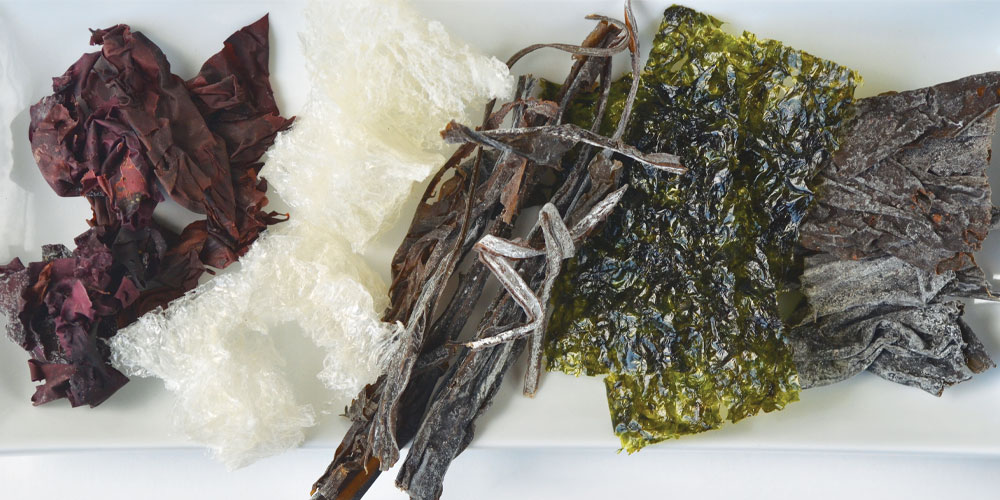
What the heck are sea vegetables?
In my 2023 trends forecast, I identified environmentally friendly foods as one to watch. Sea vegetables fall under the umbrella of environmentally friendly foods. When we think vegetables, we often think land, soil and irrigation systems. However, now we are starting to think nutritious veggies grown beneath the sea.
As a result, sea vegetables have a smaller carbon footprint than land vegetables. The Food and Agriculture Organization reports in 2020 worldwide aquaculture production, including sea vegetables, reached an all-time high of 114.5 million metric tons in live weight, representing a market value of almost $264 billion. Let’s explore further what the heck are sea vegetables.
Sea vegetables
While most people think of vegetables as growing on land, there are many nutritious vegetables growing in our oceans. The most popular sea vegetable is seaweed. I’ve been researching and writing about seaweed for over a decade including this 2015 HuffPost article.
There are over 20 types of edible seaweed and even more are being discovered. Common types of seaweed include nori, kombu, dulse and Irish moss. Most seaweed varies in colour including green, brown and red.
My business has also partnered with Algarithm Ingredients who produces plant-based, ocean-friendly omega-3 ingredients derived from micro-algae. Emerging research is looking at how seaweed can be added to animal feed to increase nutrition plus decrease methane production. And groups like the Pacific Seaweed Industry Association develop awareness, educate and promote innovation in the sector.
Nutrition and health benefits
Similar to other vegetables, research suggests sea vegetables have fibre, vitamins A, B, C and E, plus minerals like calcium and iodine that benefit your overall health and well-being.
Thyroid function
Seaweed, specifically kombu, is known for its high content of iodine, which is needed to produce two important thyroid hormones necessary for a stable metabolism. Our bodies don’t make iodine, so we must get it through food. If you have a family history of thyroid dysfunction or thyroid cancer, it is important to discuss adding seaweed to your meal plan with your dietitian. Otherwise, seaweed is an excellent food source containing the essential nutrient of iodine.
Heart and immune health
Known for its anti-inflammatory and immune boosting properties, sea vegetables are a source of omega-3 fatty acids. These essential omega-3 fats help reduce inflammation in the body, contributing to a lower risk of developing chronic conditions such as heart disease. Also, seaweed contains varying amounts of plant protein (nori having the highest amount) that are important to promoting a healthy immune system. When your immune system is in balance, the rest of your body benefits including your skin, hair and nails.
Culinary applications
Sea vegetables can be eaten raw in salads, sauteed, dried as snack foods, cooked and added to soups and teas. If you’re not familiar with the taste of sea vegetables, it has an earthy, umami flavour similar to mushrooms, fermented vegetables and some cured meats. Umami is now recognized as one of the basic tastes, along with sweet, sour, salty, and bitter. The taste of umami closely relates to the experience of savoury, meaty, or broth-like. Umami has been a trend topic with chefs for quite a while now giving us the opportunity to eat sea vegetables in restaurants.
With over 20 types of edible seaweed available, there are numerous ways you can add this interesting taste, texture and aroma to your day. Over the past five years, I’ve observed more products on retail shelves made with sea vegetables. This ready-to-eat seaweed salad is one of my favourites as a starter and a side! Consumers can now go from the occasional sushi meal to consuming sea vegetables as an everyday occurrence.
What the heck are sea vegetable final thoughts
Marine seaweed aquaculture is one of the fastest-growing segment of global food production with the world production of seaweed having tripled from 2000 to 2018. And sea vegetables don’t require soil, fresh water and new land to grow.
Sea vegetables are rich in vitamins, minerals, antioxidants and omega-3 fatty acids providing several health benefits including supporting thyroid function. They offer a unique taste opportunity from snacks to soups. As we learn more about sea vegetables, there is no time like the present to have fun exploring and experimenting with adding them to your menu.


